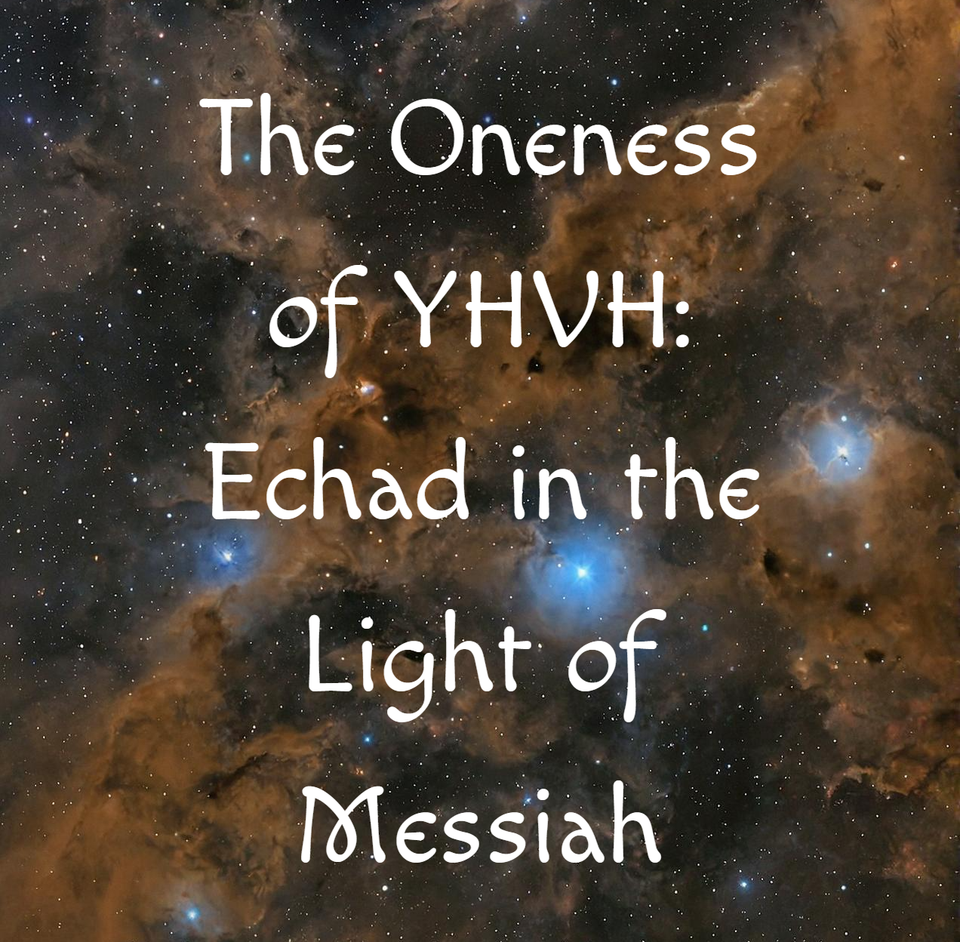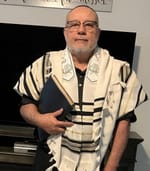The Oneness of Elohim

The Revelation of Y’hovah in HaMashiach
From the beginning of Scripture, the absolute oneness of Elohim is a cornerstone of true emunah (faith) and a foundational doctrine of Netzari Mashiach Judaism.
“Hear, O Yisrael: Y’hovah our Elohim, Y’hovah is one.”
— Devarim (Deuteronomy) 6:4, TS2009
This declaration — the Shema — stands as the heartbeat of all biblical revelation.
Yet within this oneness, Scripture progressively unveils the complex unity of Y’hovah — a unity that is neither divided nor confused, but fully revealed in Y’hoshua HaMashiach and the Ruach HaKodesh.
The Hebrew Concept of ‘Echad’
The Hebrew word translated “one” in the Shema is ’echad (אֶחָד).
’Echad speaks of compound unity, not absolute singularity (yachid).
For example:
- Berĕshith (Genesis) 1:5 — evening and morning become one (’echad) day.
- Berĕshith 2:24 — man and woman become one (’echad) flesh.
Thus, when Scripture says Y’hovah is ’echad, it describes unity within plurality — one divine essence expressed in distinct manifestations.
The Father Revealed in the Son
Y’hoshua declared plainly:
“He who has seen Me has seen the Father.”
— Yochanan (John) 14:9, CJB
The invisible Y’hovah is revealed in visible form through Y’hoshua HaMashiach.
Sha’ul echoes this truth:
“He is the image of the invisible Elohim.”
— Qolasim (Colossians) 1:15, TS2009
Y’hoshua is not a separate god, nor merely a messenger — He is the visible manifestation of the invisible Y’hovah, clothed in human flesh for the redemption of mankind.
The Manifestations of Y’hovah
Throughout Scripture, Y’hovah reveals Himself in various ways:
- As Father - the eternal source and Creator of all (Yeshayahu [Isaiah] 64:8).
- As Creator - Elohim walked with Adam and Chavah (Berĕshith [Genesis] 3:8).
- As יהוה - appeared to Avraham at the oaks of Mamre (Berĕshith [Genesis] 18:1.
- As Son - the Word made flesh, our Redeemer (Yochanan 1:14).
- As Ruach HaKodesh — the divine presence, empowering breath, sanctifying, and indwelling His people (Zechariah 4:6; Acts 1:8).
These examples are not five separate beings, but five modes of revelation of the one Y’hovah Elohim — each distinct in function, yet one in essence and purpose—many other examples like the burning bush, pillar of fire, pillar of cloud, etc.
Y’hoshua: The Name of Salvation
The name Y’hoshua (meaning “Y’hovah is salvation”) embodies the unity of the Father and the Son.
“You shall call His name Y’hoshua, for He shall save His people from their sins.”
— Mattityahu (Matthew) 1:21, CJB
In this name, Y’hovah Himself acts as Redeemer — fulfilling His own promise:
“I, even I, am Y’hovah, and besides Me there is no savior.”
— Yeshayahu (Isaiah) 43:11, TS2009
Thus, Y’hoshua is not another savior beside Y’hovah, but Y’hovah revealed as Savior.
The Word and the Spirit
The unity of the Word and the Spirit is another revelation of Y’hovah’s oneness.
In Berĕshith (Genesis) 1:2–3, the Spirit of Elohim moves upon the waters, and Elohim speaks the Word — creation unfolds through both Spirit and Word together.
Yochanan affirms this mystery:
“In the beginning was the Word, and the Word was with Elohim, and the Word was Elohim.”
— Yochanan (John) 1:1, CJB
The Word that was with Elohim, and was Elohim, becomes flesh in Y’hoshua (Yochanan 1:1, 1:14). Y'hoshua was begotten in verse 1:14. Before that, he did not exist as Y'hoshua Mashiach. He was called the Word and was the Word.
The same Spirit who moved in creation now dwells in the talmidim — uniting us with Y’hovah through HaMashiach.
The Oneness in Redemption
Y’hovah’s oneness is also revealed in His redemptive plan:
- The Father willed salvation. (By logos - means word, thought, plan).
- The Son accomplished it through His death and resurrection.
- The Ruach HaKodesh applies it within the hearts of the talmidim.
Yet all three are the one Y’hovah working in perfect unity — one Elohim, one purpose, one covenant of grace.
Sha’ul writes:
“Elohim was in HaMashiach, reconciling the world to Himself.”
— 2 Corinthians 5:19, TS2009
The Father did not send another being — He Himself (Logos), through HaMashiach, acted to redeem creation.
The Mystery of the Divine Name
The divine name Y’hovah (יהוה) expresses both being and presence — “I Am That I Am.”
In Y’hoshua, this Name takes on visible form.
Y’hoshua prayed:
“I have made Your Name known to them.”
— Yochanan (John) 17:6, CJB
Through Y’hoshua, we know Y’hovah not merely by a title, but by relationship.
The Name is revealed in the Son, and through mikveh (water immersion) and the Ruach HaKodesh, we bear that Name upon our lives.
"This Y'hoshua is the stone rejected by you builders which has become the cornerstone. There is salvation in no one else! For there is no other name under heaven given to mankind by whom we must be saved!"
Ma`asei (Acts) 4:11-12
The Unity of Y’hovah and His People
As Y’hovah is one, so He calls His people to unity:
“That they may be one, even as We are one.”
— Yochanan (John) 17:22, CJB
The unity of the body of HaMashiach reflects the unity of Y’hovah Himself.
Through the indwelling Ruach, the talmidim become partakers of the divine nature (2 Kepha [Peter] 1:4), walking in love, holiness, and truth.
The oneness of Avinu Elohei is the foundation of all true emunah (faith). Netzari Mashiach Judaism is that emunah.
From the Tanakh to the B’rit Chadashah, the revelation remains the same: Y’hovah is One — revealed as Our Father, manifested in Y’hoshua HaMashiach, and active through the Ruach HaKodesh.
To know Y’hoshua is to know the Father; to receive His Spirit is to receive Y’hovah Himself.
“For of Him, and through Him, and to Him are all things. To Him be glory forever. Amen.”
— Romans 11:36, TS2009
To Y’hovah be all glory, through Y’hoshua HaMashiach, by the Ruach HaKodesh.
Amen v’Amen.
By Rabbi Francisco Arbas
📧 franciscoarbas.yisrael@gmail.com
Following His ‘WAY’ — Netzari Mashiach Judaism


Comments ()